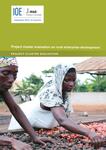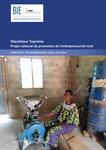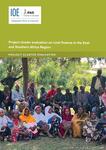Page Header

Downloads:
3
Post-Tsunami Sustainable Livelihoods Programme for the Coastal Communities of Tamil Nadu
Overview
The Independent Office of Evaluation of IFAD (IOE) has conducted a performance evaluation of the Post-Tsunami Sustainable Livelihoods Programme for the Coastal Communities of Tamil Nadu, in India. The project, implemented in two phases from 2007 to 2020, was designed to support the long-term recovery from the effects of the 2004 Indian Ocean tsunami. The evaluation found that overall, the project performed well. The project enabled fiscal discipline and accessible financial services by supporting the targeted population through community-based organizations. The project also developed a multisectoral approach to livelihoods, allowing for diversification and risk mitigation for the targeted population. However, it lacked strategies to effectively reach certain marginalized groups. In terms of gender equality, the project’s community based approach could have benefited from a tailored gender strategy designed to effectively transform gender relations and enable gender equality at the household and community levels. While the project sought to support the livelihoods of fisheries-based communities, for example by providing loans and training, the lack of a sound and systematic sustainability strategy across all project interventions, focusing on managing key risks, may hinder the project’s overall sustainability of benefits in the long term. The report’s recommendations for the future include expending additional efforts on sustainable multisector strategies and adequate strategies for fisheries, gender and resource management to ensure sustainable livelihoods among coastal communities of Tamil Nadu.Report Details
| Year Published | |
| Type | |
| Joint | No |
| Partner/s | N/A |
| Consultant name | |
| Agency Focal Point | Massiel Jiménez |
| Focal Point Email | m.jimenez@ifad.org |
| Managed by Independent Evaluation Office | Yes |
| Country/ies |
YOU 'RE READING
Post-Tsunami Sustainable Livelihoods Programme for the Coastal Communities of Tamil Nadu








